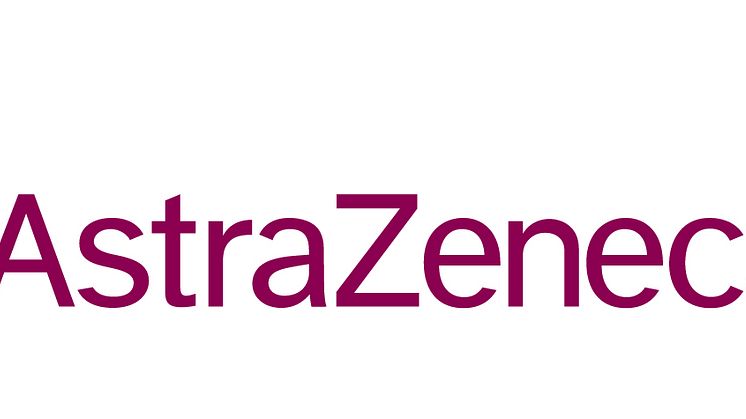
Pressmeddelande -
Imfinzi is the only immunotherapy to demonstrate overall survival at three years in unresectable Stage III non-small cell lung cancer
Data presented at ASCO 2019 showed 57% of patients alive at three years vs. 43.5% on placebo
AstraZeneca has presented three-year overall survival (OS) results from the Phase III PACIFIC trial of Imfinzi (durvalumab) in unresectable, Stage III non-small cell lung cancer (NSCLC) during the 2019 American Society of Clinical Oncology (ASCO) Annual Meeting in Chicago.
These latest results show a durable and sustained OS benefit in patients with unresectable, Stage III NSCLC who had not progressed following concurrent chemoradiation therapy (CRT), a previous standard-of-care (SoC) treatment. The OS rate was 57% at three years for patients receiving Imfinzi vs. 43.5% for placebo following concurrent CRT. Median OS was not yet reached with the Imfinzi arm vs. 29.1 months for placebo.
Dave Fredrickson, Executive Vice President, Oncology Business Unit said: “These findings for Imfinzi are another example of our focus on bringing long-term survival benefits to patients who still have a chance of being cured. These three-year survival results further establish the PACIFIC regimen as the standard of care for these patients, and we are optimistic this survival trend will continue as we move towards the five-year landmark in this curative-intent setting.”
Results build on the primary two-year OS analysis that was published in TheNew England Journal of Medicine in September 2018 and demonstrated a significant OS benefit for treatment with Imfinzi vs. placebo after CRT, regardless of PD-L1 expression. The primary analysis showed Imfinzi reduced the risk of death by 32% (HR 0.68, [99.73% CI, 0.47-0.997], p=0.0025).
With the additional year of follow up, the latest results for Imfinzi showed consistent and durable efficacy, maintaining a 31% reduction in the risk of death vs. placebo after CRT (HR 0.69, [95% CI 0.55-0.86]).
Jhanelle Gray, MD, Director of Clinical Research in the Thoracic Oncology Department at Moffitt Cancer Center in Tampa, Florida, and an investigator in the PACIFIC trial, said: “In the past, patients with unresectable, Stage III non-small cell lung cancer faced five-year survival rates of only 15% to 30%. It is remarkable to see that more than half of patients treated with the PACIFIC regimen remain alive at three years, an important milestone that raises the bar for treatments in this curative-intent setting.”
The safety and tolerability profile for Imfinzi was consistent with the results reported at the time of the previous OS analysis.Among patients receiving Imfinzi, the most common adverse events (AE) (greater than or equal to 20% of patients) vs. placebo were cough (35.2% vs. 25.2%), fatigue (24.0% vs. 20.5%), dyspnoea (22.3% vs. 23.9%) and radiation pneumonitis (20.2% vs. 15.8%). 30.5% of patients experienced a grade 3 or 4 AE with Imfinzi vs. 26.1% with placebo, and 15.4% of patients discontinued treatment due to AEs with Imfinzi vs. 9.8% of patients on placebo.
Building on PACIFIC
AstraZeneca has several ongoing trials focused on testing Imfinzi in earlier stages of NSCLC (Stages I-III) in potentially-curative settings. The Phase III PACIFIC-2 trial design, presented today at the ASCO Annual Meeting, is evaluating Imfinzi given concurrently with CRT in patients with unresectable, Stage III NSCLC. In the Phase II PACIFIC-6 trial, Imfinzi is being tested in the same population following sequential chemotherapy and radiation therapy.
Additional trials assess Imfinzi in the neoadjuvant setting (prior to other treatments) in Stage II and III NSCLC patients (AEGEAN) and in the adjuvant setting (following the primary treatment) in Stage I to III (BR.31). The Phase III PACIFIC-4 trial is testing Imfinzi in unresected Stage I and II NSCLC patients following definitive stereotactic body radiation therapy (SBRT).
AstraZeneca is also testing novel combinations with Imfinzi in two Phase II platform trials in both unresectable, Stage III disease (COAST) and in resectable Stage I-III disease starting before surgery (NeoCOAST), to help find solutions for NSCLC patients not benefiting from currently-available therapies.
| Immuno-Oncology trials in early-stage non-small cell lung cancer (NSCLC) | |||
| Trial name | Phase | Population | Trial arms |
| Stages I-III | |||
| PACIFIC-4 | Phase III | Unresected, Stage I/II NSCLC | Imfinzi monotherapy vs. placebo following definitive SBRT |
| AEGEAN | Phase III | Resectable, Stage II and III NSCLC,neoadjuvant (incl. EGFR/ALK positive)1 | SoC chemotherapy + Imfinzi vs. SoC chemotherapy + placebo followed by surgery |
| ADJUVANT BR.312 | Phase III | Completely resected, Stage Ib-IIIa NSCLC (incl. EGFR/ALK positive)1 | Placebo vs. Imfinzi monotherapy |
| NeoCOAST | Phase II | Resectable, Stage I-IIIA NSCLC | Imfinzi in combination with potential new medicines vs. Imfinzi monotherapy followed by surgery |
| COAST | Phase II | Unresectable, Stage III NSCLC following concurrent CRT | Imfinzi in combination with potential new medicines vs. Imfinzi monotherapy |
| Stage III | |||
| PACIFIC-2 | Phase III | Unresected, Stage III NSCLC | Concurrent CRT + placebo vs. concurrent CRT + Imfinzi |
| PACIFIC-5 | Phase III | Unresected, Stage III NSCLC (ex US global trial, China focus) | Placebo following concurrent CRT vs. Imfinzi following concurrent CRT |
| PACIFIC-6 | Phase II | Unresectable, Stage III NSCLC | Imfinzi following sequential CRT |
1. EGFR = epidermal growth factor receptor, ALK = anaplastic lymphoma kinase 2. BR.31 is an externally-sponsored research study led by the Canadian Cancer Trials Group (CCTG)
Imfinzi is approved for the treatment of unresectable, Stage III non-small cell lung cancer in more than 45 countries, including the US, EU and Japan, based on the Phase III PACIFIC trial. Since the first approval in February 2018, more than 20,000 patients in this setting have been treated with Imfinzi.
About PACIFIC
The PACIFIC trial is a Phase III, randomised, double-blinded, placebo-controlled, multi-centre trial of Imfinzi as treatment in ‘all-comer’ patients (i.e. regardless of PD-L1 status) with unresectable, Stage III (locally-advanced) NSCLC whose disease has not progressed following platinum-based chemotherapy and radiation therapy (CRT).
The trial is being conducted in 235 centres across 26 countries involving 713 patients. The primary endpoints of the trial are progression-free survival (PFS) and OS, and secondary endpoints include landmark PFS and OS, objective response rate, and duration of response.
About Stage III NSCLC
Stage III (locally-advanced) NSCLC is commonly divided into three sub-categories (IIIA, IIIB and IIIC), defined by how much the cancer has spread locally and the possibility of surgery.1 Stage III disease is different from Stage IV disease, when the cancer has spread (metastasised) to distant organs, as Stage III is currently treated with curative intent.1,2
Stage III NSCLC represents approximately one-third of NSCLC incidence and was estimated to affect nearly 200,000 patients in the top-eight countries (China, France, Germany, Italy, Japan, Spain, UK, US) in 2015.3,4 The majority of Stage III NSCLC patients are diagnosed with unresectable tumours.5 No new treatments beyond chemoradiation therapy, followed by active surveillance to monitor for progression, have been available to patients for decades.6-9
About Imfinzi
Imfinzi (durvalumab) is a human monoclonal antibody that binds to PD-L1 and blocks the interaction of PD-L1 with PD-1 and CD80, countering the tumour's immune-evading tactics and releasing the inhibition of immune responses.
Imfinzi is approved for unresectable, Stage III NSCLC in more than 45 countries including the US, in the EU, and Japan based on the Phase III PACIFIC trial. Imfinzi is also approved for previously-treated patients with advanced bladder cancer in the US, Canada, Brazil, Australia, Israel, India, United Arab Emirates, Qatar, Macau and Hong Kong.
As part of a broad development programme, Imfinzi is also being tested as a monotherapy and in combination with tremelimumab, an anti-CTLA4 monoclonal antibody and potential new medicine, as a treatment for patients with NSCLC, small cell lung cancer, bladder cancer, head and neck cancer, liver cancer, cervical cancer, biliary tract cancer and other solid tumours.
About AstraZeneca in lung cancer
AstraZeneca has a comprehensive portfolio of approved and potential new medicines in late-stage clinical development for the treatment of different forms of lung cancer spanning several stages of disease, lines of therapy and modes of action. We aim to address the unmet needs of patients with EGFR-mutated tumours as a genetic driver of disease, which occur in 10-15% of NSCLC patients in the US and EU and 30-40% of NSCLC patients in Asia, with our approved medicines Iressa (gefitinib) and Tagrisso (osimertinib), and ongoing Phase III trials FLAURA, ADAURA and LAURA as well as the Phase II exploratory combination trials SAVANNAH and ORCHARD.10-12
Our extensive late-stage Immuno-Oncology programme focuses on lung cancer patients without a known genetic mutation which represents up to 50% of all patients with lung cancer. Imfinzi (durvalumab), an anti-PDL1 antibody, is in development as monotherapy (Phase III trials ADJUVANT BR.31, PACIFIC-4, PACIFIC-5, and PEARL) and in combination with tremelimumab and/or chemotherapy (AEGEAN, PACIFIC-2, NEPTUNE, POSEIDON, ADRIATIC and CASPIAN Phase III trials).
About AstraZeneca’s approach to Immuno-Oncology (IO)
IO is a therapeutic approach designed to stimulate the body’s immune system to attack tumours. Our IO portfolio is anchored by immunotherapies that have been designed to overcome anti-tumour immune suppression. We believe that IO-based therapies offer the potential for life-changing cancer treatments for the clear majority of patients.
We are pursuing a comprehensive clinical-trial programme that includes Imfinzi (anti-PDL1) as monotherapy and in combination with tremelimumab (anti-CTLA4) in multiple tumour types, stages of disease, and lines of therapy, using the PD-L1 biomarker as a decision-making tool to define the best potential treatment path for a patient. In addition, the ability to combine our IO portfolio with small, targeted molecules from across our Oncology pipeline, and from our research partners, may provide new treatment options across a broad range of tumours.
About AstraZeneca in Oncology
AstraZeneca has a deep-rooted heritage in Oncology and offers a quickly-growing portfolio of new medicines that has the potential to transform patients’ lives and the Company’s future. With at least six new medicines to be launched between 2014 and 2020, and a broad pipeline of small molecules and biologics in development, we are committed to advance Oncology as a key growth driver for AstraZeneca focused on lung, ovarian, breast and blood cancers. In addition to our core capabilities, we actively pursue innovative partnerships and investments that accelerate the delivery of our strategy as illustrated by our investment in Acerta Pharma in haematology.
By harnessing the power of four scientific platforms – Immuno-Oncology, Tumour Drivers and Resistance, DNA Damage Response and Antibody Drug Conjugates – and by championing the development of personalised combinations, AstraZeneca has the vision to redefine cancer treatment and one day eliminate cancer as a cause of death.
About AstraZeneca
AstraZeneca is a global, science-led biopharmaceutical company that focuses on the discovery, development and commercialisation of prescription medicines, primarily for the treatment of diseases in three therapy areas - Oncology, Cardiovascular, Renal & Metabolism and Respiratory. AstraZeneca operates in over 100 countries and its innovative medicines are used by millions of patients worldwide. For more information, please visit astrazeneca.comand follow us on Twitter @AstraZeneca.
| Media Relations | ||
| Gonzalo Viña | +44 203 749 5916 | |
| Rob Skelding | Oncology | +44 203 749 5821 |
| Rebecca Einhorn | Oncology | +1 301 518 4122 |
| Matt Kent | BioPharma | +44 203 749 5906 |
| Jennifer Hursit | Other | +44 203 749 5762 |
| Christina Malmberg Hägerstrand | Sweden | +46 8 552 53 106 |
| Michele Meixell | US | +1 302 885 2677 |
| Investor Relations | ||
| Thomas Kudsk Larsen | +44 203 749 5712 | |
| Henry Wheeler | Oncology | +44 203 749 5797 |
| Christer Gruvris | BioPharma (cardiovascular, metabolism) | +44 203 749 5711 |
| Nick Stone | BioPharma (respiratory, renal) | +44 203 749 5716 |
| Josie Afolabi | Other medicines | +44 203 749 5631 |
| Craig Marks | Finance, fixed income | +44 7881 615 764 |
| Jennifer Kretzmann | Corporate access, retail investors | +44 203 749 5824 |
| US toll-free | +1 866 381 72 77 |
References
1 ASCO. Cancer.net. Lung Cancer – Non-Small Cell. Available at: https://www.cancer.net/cancer-types/lung-cancer/view-all. Accessed May 2019.
2 Cheema PK, et al. Perspectives on Treatment Advances For Stage III Locally Advanced Unresectable Non-Small-Cell Lung Cancer.Curr Oncol. 2019;26(1):37–42. doi:10.3747/co.25.4096. Accessed May 2019.
3 Antonia SJ, et al. PACIFIC Investigators. Durvalumab After Chemoradiotherapy In Stage III Non-Small-Cell Lung Cancer. N Engl J Med. 2017;377(20):1919-1929.
4 EpiCast Report: NSCLC Epidemiology Forecast to 2025. GlobalData. 2016.
5 Provencio M, et al. Inoperable Stage III Non-Small Cell Lung Cancer: Current Treatment And Role Of Vinorelbine. J Thorac Dis. 2011;3:197-204. Accessed May 2019.
6 Eberhardt WE, et al. Panel Members. 2nd ESMO Consensus Conference in Lung Cancer: locally advanced Stage III non-small-cell lung cancer. Ann Oncol. 2015;26(8):1573-1588.
7 Gandara DR, et al. Long-Term Survival with Concurrent CRT Followed by Consolidation Docetaxel in Stage IIIB Non-Small-Cell Lung Cancer: A Phase II Southwest Oncology Group Study (S9504). Clin Lung Cancer. 2006;8(2):116-121.
8 Hanna N. Current Standards and Clinical Trials in Systemic Therapy for Stage III Lung Cancer: What is New? Am Soc Clin Oncol Educ Book. 2015:e442-447.
9 NCCN Clinical Practice Guidelines in Oncology (NCCN Guidelines). Non-small cell lung cancer, version 8. 2017. https://www.nccn.org/professionals/physician_gls/pdf/nscl_blocks.pdf. Published August 3, 2017. Accessed May 2019.
10 Szumera-Ciećkiewicz A, et al. EGFR Mutation Testing on Cytological and Histological Samples in Non-Small Cell Lung Cancer: a Polish, Single Institution Study and Systematic Review of European Incidence. Int J Clin Exp Pathol. 2013:6;2800-12. Accessed May 2019.
11 Keedy VL, et al. American Society of Clinical Oncology Provisional Clinical Opinion: Epidermal Growth Factor Receptor (EGFR) Mutation Testing for Patients with Advanced Non-Small-Cell Lung Cancer Considering First-Line EGFR Tyrosine Kinase Inhibitor Therapy. J Clin Oncol. 2011:29;2121-27. Accessed May 2019.
12 Ellison G, et al. EGFR Mutation Testing in Lung Cancer: a Review of Available Methods and Their Use for Analysis of Tumour Tissue and Cytology Samples. J Clin Pathol. 2013:66;79-89. Accessed May 2019.
Ämnen
Om AstraZeneca
AstraZeneca är ett globalt, innovationsdrivet bioläkemedelsföretag med fokus på forskning, utveckling och marknadsföring av receptbelagda läkemedel, primärt för behandling av sjukdomar inom tre huvudsakliga terapiområden: cancer, kardiovaskulära sjukdomar, njursjukdomar och metabola sjukdomar och sjukdomar i andningsvägarna. Bolaget är också selektivt aktivt inom autoimmunitet, neurovetenskap och infektion. AstraZeneca bedriver verksamhet i över 100 länder och dess innovativa läkemedel används av miljontals patienter över hela världen.
Mer information finns på: www.astrazeneca.com och www.astrazeneca.se. Du kan även följa oss på twitter https://twitter.com/AstraZenecaSE


